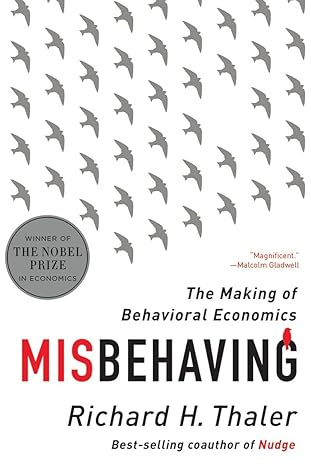Main Topic
Misbehaving explores the evolution and development of behavioral economics, shedding light on how human psychology and decision-making deviate from traditional economic theories.
Key Ideas or Arguments
- Behavioral Economics Emergence: Thaler traces the rise of behavioral economics, challenging the assumptions of classical economics that presume rational decision-making.
- Concept of Nudge: Thaler introduces the concept of “nudge,” emphasizing how small, indirect interventions can guide individuals toward better choices without restricting their freedom.
- Limits of Rationality: The book explores the limitations of human rationality, addressing biases, heuristics, and the impact of social influences on decision-making.
Chapter Titles or Main Sections
The Birth of Behavioral Economics: Thaler discusses the early foundations of behavioral economics and his role in its establishment.
The Foundations of Behavioral Economics: This section delves into the key principles that underpin behavioral economics, highlighting departures from traditional economic theories.
Nudging and Choice Architecture: Thaler explores the concept of nudging and how designing choices can influence decisions positively.
The Limits of Rationality: Focusing on the cognitive biases and deviations from rational behavior, this chapter illuminates the constraints on human decision-making.
Behavioral Economics in Action: Thaler provides real-world examples where behavioral economics has been applied, showcasing its impact on policies and business.
Key Takeaways
- Traditional economic models oversimplify human behavior.
- Nudging can improve decision outcomes without restricting choices.
- Acknowledging the limits of rationality is crucial for designing effective policies.
- Behavioral economics has practical applications in various domains.
Author’s Background and Qualifications
Richard H. Thaler is an economist and a Nobel laureate recognized for his contributions to behavioral economics. He has extensive experience in both academia and advising governments on economic policies.
Comparison to Other Books
Compared to other books on behavioral economics, Misbehaving stands out for its blend of academic insight and real-world applications, offering a comprehensive narrative of the field’s development.
Target Audience
The book caters to a broad audience, from students and scholars of economics to policymakers and anyone interested in understanding the interplay between psychology and economics.
Reception or Critical Response
Misbehaving has received positive reviews for its engaging writing style, accessibility, and the way it demystifies complex economic concepts. Critics appreciate its contribution to challenging traditional economic thinking.
Publisher and First Published Date
- Publisher: W. W. Norton & Company
- First Published: 2015
Recommendations
- “Thinking, Fast and Slow” by Daniel Kahneman.
- “Predictably Irrational” by Dan Ariely.
Biggest Takeaway
Behavioral economics, as explored in Misbehaving, fundamentally challenges the assumptions of classical economics by highlighting the importance of understanding and incorporating human psychology into economic models.



